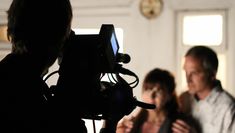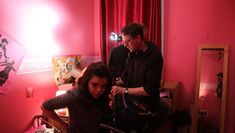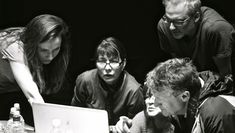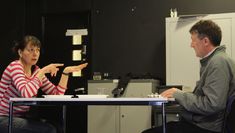Profile
Supervisors
Dr Tony Fisher and Dr Joel Anderson
Project Title
Theatre, the last hope for film? The use of theatre techniques to interrupt the Hollywood mode of film production.
Abstract
The thesis examines the possibility of using theatre techniques to interrupt the ideologies and aesthetic effects of conventional ‘Hollywood mode’ films. Mainstream cinema uses a complex set of rules and conventions to create in the spectator an experience of a fictional world masquerading as reality. These rules and conventions are applied to every aspect of the Hollywood mode of film production to conceal the apparatus of film with the objective of creating a psychological connection between the spectator and the protagonist’s objectives, in other words, to make the reality behind the façade of film’s spontaneous appearance of life ‘invisible’ to the spectator. In this ‘hypnotic’ state, the spectator is incapable of making an objective and rational judgment concerning the subject matter on screen or the social realities underlying it or to assess the mode of representation and its effects. The thesis examines theatre techniques as a source for strategies that can be used by filmmakers to interrupt the Hollywood mode, to arouse the spectator out of the sense of stupor that it creates, and it creates the link between these techniques and film by creating a new concept, ‘film-theatre,’ to describe a selection of theatre techniques that are particularly adapted for use in film. Three film-theatre techniques – improvisation, Brechtian alienation techniques and the use of theatrical framing for extended periods of time – are examined through the case studies to provide an understanding of how they interrupt or offer alternative aesthetic possibilities to the Hollywood mode. These studies are becoming increasingly important and relevant as the Hollywood mode’s influence has spread both vertically and horizontally in the global film industry. Not only has there been a rapid expansion of the use of the Hollywood mode in the film industries of several countries around the world, but also this influence has now permeated other modes of film delivery and distribution, including television and online streaming. The opportunities for independent filmmakers to offer an aesthetic that challenges the Hollywood mode are diminishing. The time is therefore ripe for a full reappraisal of the effects of the Hollywood mode and how and why it should be challenged. Film-theatre provides, this thesis argues, a productive strategy for conducting this appraisal, while offering a viable and effective means to interrupt the Hollywood mode.
Profile
I have produced and directed a number of short films (including some documentaries) and one full length feature film, Waking David. I have also served as a part-time assistant lecturer in film studies at Queen Mary University of London and provide a yearly two-day workshop at Central for scriptwriting postgraduate students on the ‘script to screen’ process. As a film director, my particular interest is working in a collaborative improvisation process with actors to create scripts and, through a series of rehearsals on and off the film set to establish the shooting aesthetics of the film. In this sense, my approach combines certain aspects of both Mike Leigh’s and John Cassavetes’ production processes. I share with both of those directors a reluctance to create films in the Hollywood mode that are designed to engage with one protagonist’s psychological motivation. I am more interested in the exploration of characters rather than narrative resolutions of their objectives.
Practice
Actor (1999 to 2010)
Film producer and director (2000 to present)
Executive Producer, Director, Co-Writer of Waking David (feature film, 2016)
Produced, directed, filmed and edited documentary Dialogue for Dyslexia: A Youth Theater Speaks Out (for Dallas Children’s Theater, 2011)
Co-produced, edited and directed documentary Deep Ellum (with Tiffany Kieran, 2007)
Produced, directed and edited Finding Shakespeare’s Keeper (documentary, 2006)
Produced, directed and edited AIR (45 minutes, dramatic short film, 2003)
Wrote, directed and edited Esresso Con Panna (20 minutes, short film, 2001)
Teaching Areas/Expertise
- Film directing
- Scriptwriting










